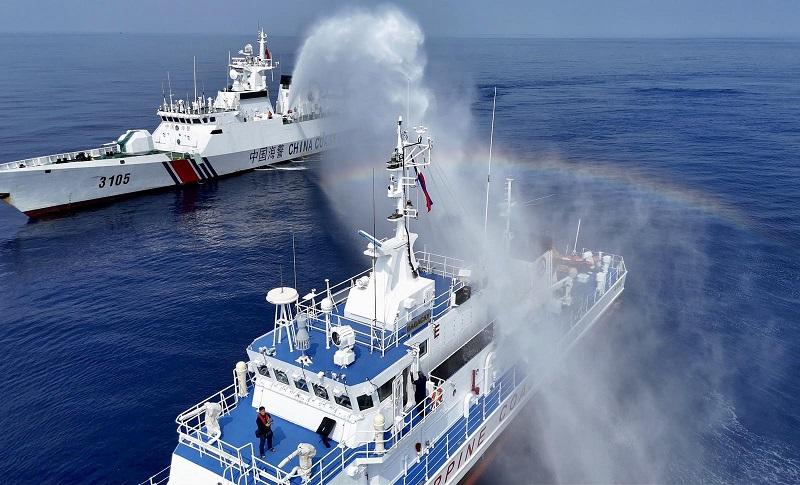Lawmakers: PH should 'double down' defense in WPS

The Philippines should not relent against bullies by "doubling down" on the Marcos administration’s effort to gather allies against Chinese aggression in the West Philippine Sea, lawmakers said.
Representatives Rodge Gutierrez of 1-Rider partylist and House Assistant Minority Leader Zia Adiong of Lanao del Sur made the position in response to China’s Coast Guard vessel again firing water cannon against a Philippine Coast Guard ship, even hitting the Philippine flag this time.
“Kawawa po tayo [sa nangyari]. Nakakagalit. This is why we should double down on what the President (Ferdinand Marcos, Jr.) is doing. Kinakawawa po tayo. To find out that this happened again, just when we are talking about measures that we are to take....it highlights the importance of what the President is doing,” Gutierrez, a lawyer and a member of the House special panel on the West Philippine Sea, said.
(We look pitiful in this situation. This is appalling. We are being oppressed here.)
Gutierrez was referring to President Marcos, Jr.'s participation in the recent Trilateral Leaders Summit in Washington between President Marcos, Jr., US President Joe Biden, and Japan’s Prime Minister Fumio Kishida wherein the Chief Executives vowed to ensure a free, prosperous, and secure Indo-Pacific.
During the summit, Marcos, Jr. said that a cooperation agreement between the Philippines, the United States and Japan “will change the dynamic in the South China Sea and the region.”
“Are we going to give in to intimidation? I think those are the questions that we have to remember on (the) West Philippine Sea. I can speak on behalf of everyone, we condemn this incident, and we condemn the narrative of China,” Gutierrez said.
“We will not stand for this. And you can be rest assured that here in Congress, we will be taking this seriously,” he added.
Adiong, for this part, said that China’s bullying should never be tolerated, especially since the Hague-based Permanent Court of Arbitration already rejected China’s nine-dash claim of the entire South China Sea, called the West Philippine Sea in the Philippines, in a July 2016 court ruling.
The same Hague court ruling also upheld the Philippines' 200 nautical miles off the territorial sea as its exclusive economic zone as provided under the United Nations Convention on the Law of the Seas, as well as declared that the Panganiban (Mischief) Reef, Ayungin (Second Thomas) Shoal and Recto (Reed) Bank) as within the Philippines' EEZ.
In addition, the same court ruled that Scarborough Shoal is a common fishing ground.
“This bullying tactic [of China]...a strategy like that should be countered with a strong opposition and the President has taken that. The President’s position is that nobody should encroach on anybody's territory and he does not want to encroach on the territory of any other country. We are merely protecting ours. And our claims are not random or baseless. This is supported by a court decision and the UNCLOS,” Adiong, vice chairperson of the House national defense and security panel, said.
“They (China) want to portray to the whole world that they're a superpower and that's why they can step on us anytime they want,” Adiong said.
“We should not have a defeatist attitude. We should stand up for what is right, and the President is standing on a very legitimate position. We need to support him on that,” Adiong added.
On Tuesday, Chinese state media reported that the CCG has "expelled" a PCG ship and another vessel from waters adjacent to the Scarborough Shoal.
A separate Reuters report quoted Chinese ministry spokesperson Lin Jin as telling the Philippines to stop provocations and to not challenge China's determination to safeguard its "sovereignty."
"Philippine ships intruded without China's permission and the Chinese coast guard took necessary measures to drive them away," said Lin Jian, who was addressing a query on the matter.
The Philippines and China have repeatedly clashed in recent months at the submerged reef.
China claims almost the entire South China Sea, a conduit for more than $3 trillion of annual ship-borne commerce, including parts claimed by the Philippines, Vietnam, Indonesia, Malaysia, and Brunei. —VAL, GMA Integrated News




